Nov 9, 2024 – Jungto Dharma School Dharma Q&A
Hello. Today, Sunim is having a Dharma Q&A session with students who enrolled in the Jungto Dharma School last September.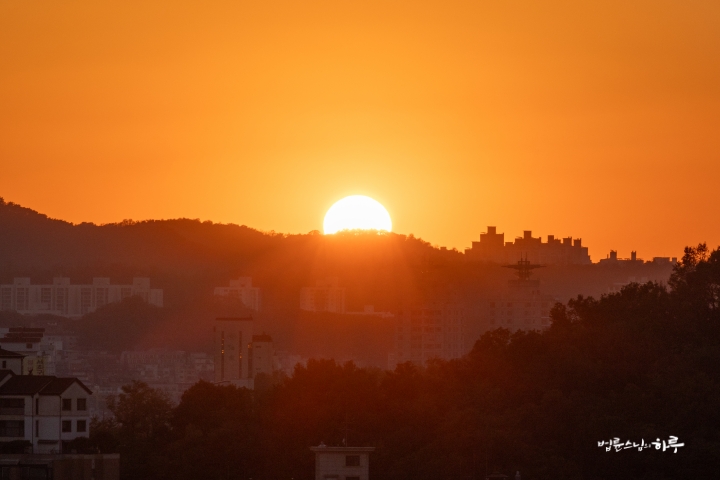
After completing his morning practice and meditation, Sunim took his seat in front of the camera in the broadcasting room of the Seoul Jungto Center at 10 AM.
All 2,000 Jungto Dharma School students entered the video conference room, waving and greeting each other.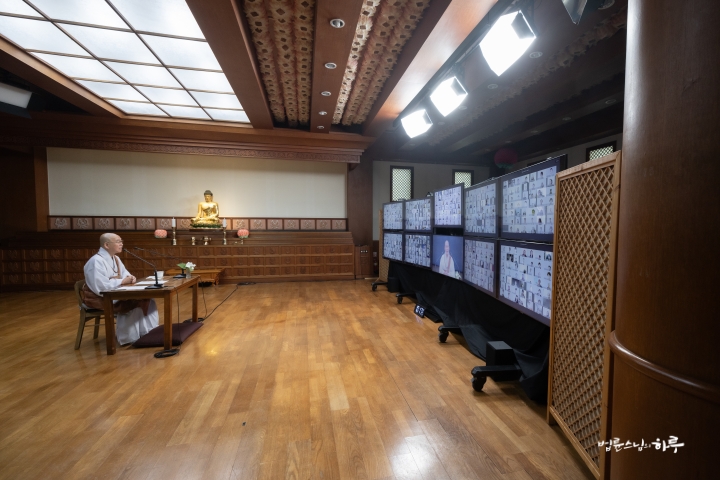
First, they watched a video of Jungto Dharma School students engaging in environmental activities. Then, they had time to share their thoughts on what they had experienced during the classes. Over the past six weeks, students have completed four sessions of the “Practical Buddhist Thought” course, along with “Sharing Retreat” and “Buddhism and Environment” classes. Three students shared their experiences.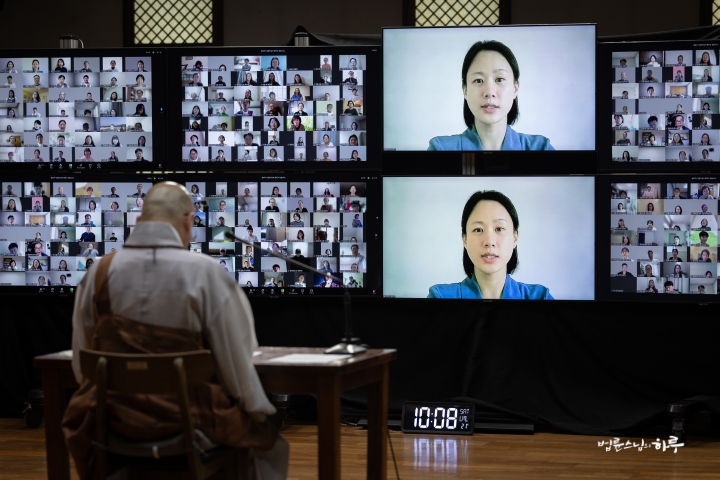
“I really enjoyed practicing environmental actions, but since then, I’ve started to notice other people’s litter more. However, when Sunim said, ‘Acknowledge our differences and do what you can do well,’ I felt like a tangled thread was unraveling. I used to be a sensitive and extreme person, but I’m gradually finding my center and feeling more at ease, for which I’m grateful.”
“I applied to the Jungto Dharma School because I felt bored with my long-term job. I was deeply moved by the fact that all facilitators and helpers are volunteers, and I realized that society functions properly thanks to people who dedicate themselves in various places. I decided to embark on the path of a practitioner who realizes and practices.”
“Sunim’s words that we suffer because we insist on only what we know as truth and live according to our temperament really resonated with me. I used to feel very frustrated when I looked at my husband, who had no plans for the future and didn’t contribute to living expenses. But after attending the Jungto Dharma School classes, I thought, ‘I should be grateful just for my husband being by my side.’ I set reducing my nagging towards my husband as my personal practice goal, and as I practiced, I truly realized that ‘everything depends on my mind.’ I will continue to learn and observe my mind carefully.”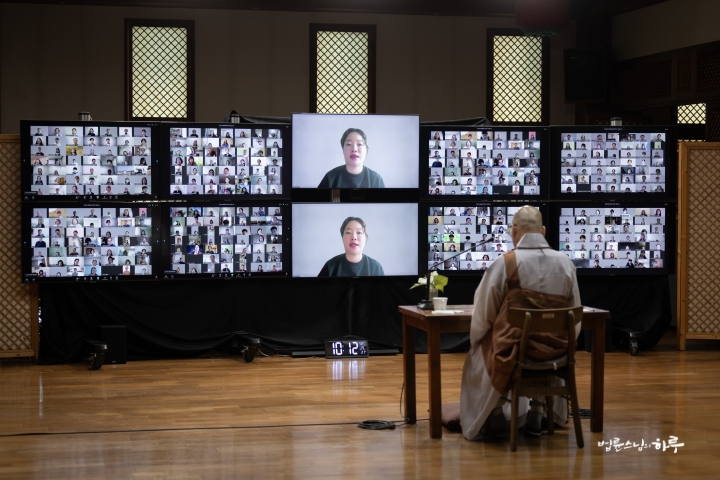
We listened well to the reflections of students who are getting to know themselves and finding freedom and happiness. Then, everyone together paid respect to Sunim with three bows, requesting his teaching. Sunim smiled and began his greeting.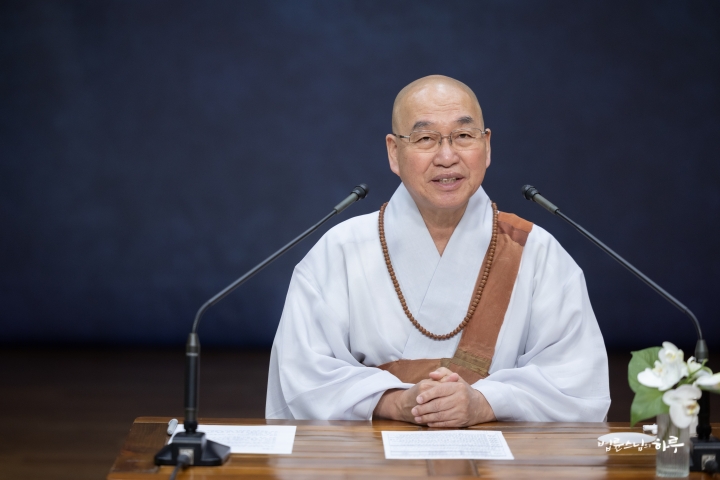
“Have you studied well over the past six weeks? We met at the entrance ceremony, and now we’re meeting again today. Hearing in the reflections that in just six weeks, changes have occurred in your minds, suffering has decreased, and joy has increased a little, I think, ‘The Jungto Dharma School is progressing well!’ During the past six weeks, you must have asked questions to the Dharma teachers and received answers as you studied. Despite that, we’ll now take time to discuss any points that are still unclear.”
Next, we watched a video showing the recent completion of a new school in the Turkey-Syria border region, which had been destroyed by an earthquake. After watching the video, Sunim continued speaking.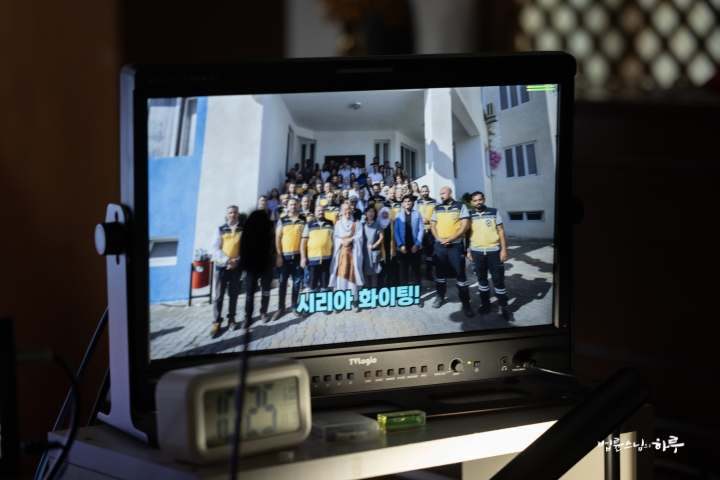
“As you just saw in the video, Syria has been suffering from a war that has lasted over 10 years, resulting in 3.5 million refugees living in very difficult conditions. On top of that, they’ve been hit by earthquake damage, leaving many people in a state of despair. To give them hope, JTS collaborated with the White Helmets, a trusted organization in the area, to build a new school for 4,000 students.
The extent of war damage becomes immediately apparent when you visit war-affected areas. Not only in Ukraine and Israel but also on the Korean Peninsula, the risk of war is gradually escalating. Before a war breaks out, one might think, ‘War could happen. We just need to win.’ But when war actually occurs, regardless of winning or losing, the damage is enormous.
There Must Never Be War on This Land Again
The Korean Peninsula has a dense population in a small area, and both sides have an enormous number of weapons of mass destruction. Moreover, South Korea has a military alliance with the United States, the world’s strongest military power, while North Korea has a military alliance with Russia, the second strongest military power. Surrounding us are economic powerhouses like China and Japan. If a war were to break out in this situation, the damage would be beyond imagination. North Korea has nuclear weapons, and South Korea has nuclear power plants. If a nuclear power plant were to be destroyed, the damage would be no different from a nuclear bomb being dropped. Therefore, we all need to clearly maintain the perspective that war must never happen again on this land.
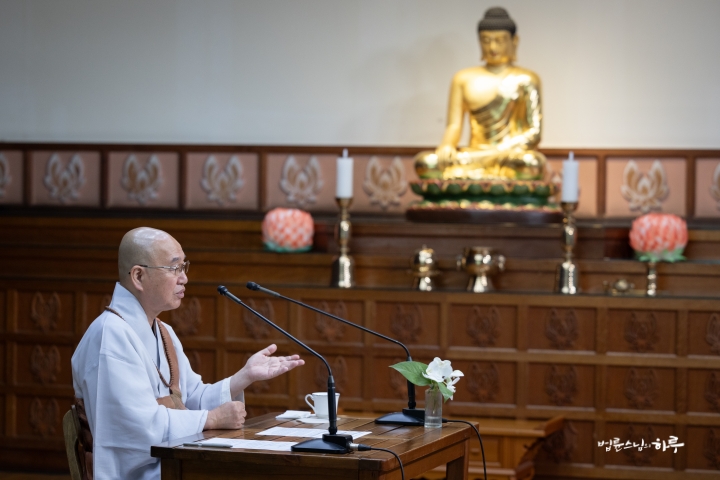
When social and political conflicts are severe, hardline factions always tend to gain the upper hand. This is because a side that takes a moderate stance can easily appear weak, while a side that takes a hard line tends to gain public support more readily. That’s why wars happen. When citizens become more wise and clearly hold the view that ‘War is absolutely unacceptable,’ we can maintain peace on the Korean Peninsula.
Coincidentally, with President Trump’s election in the United States, while global uncertainties have increased in various ways, we can hope that ‘the risk of war might decrease a little.’ President Trump is not supported by the military-industrial complex and comes from a business background, so he’s more likely to move towards stopping wars that bring significant economic losses. Regardless of who wins or loses, I hope we can move towards stopping the war through a ceasefire first.
However, unfortunately, the North Korean government has already dispatched troops to Russia, and the South Korean government is making statements as if it will sell weapons or even send troops like North Korea. This state of affairs is a terribly misguided policy that threatens peace on the Korean Peninsula and, by extension, world peace. Our country has prided itself on loving peace and not invading other countries throughout its 5,000-year history. But recently, South Korea takes pride in exporting weapons of mass destruction to the world, while North Korea boasts about being a nuclear weapons state and even sends troops abroad. These defense and diplomatic policies on both sides risk leaving a significant blemish on our country’s history. I hope that we all, regardless of progressive or conservative, ruling party or opposition, Christianity or Buddhism, would focus on preventing war and maintaining peace with one heart.”
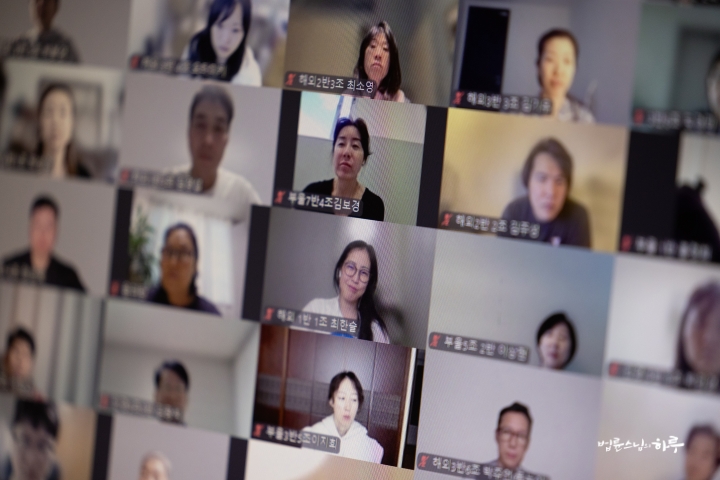
Next, questions were taken about points of curiosity. The Jungto Dharma School students are currently studying the course on Practical Buddhist Thought, which covers the fundamental doctrines of Buddhism. There were various questions about this. Five people had pre-registered their questions and engaged in dialogue with Sunim. One of them sought Sunim’s advice on how to practice mindfulness when anger is recognized but doesn’t disappear in daily life.
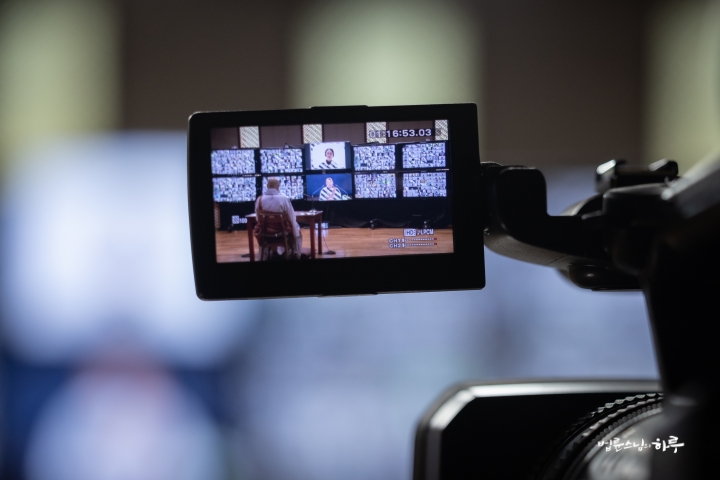
I Recognize My Anger, But It Doesn’t Go Away. How Can I Control My Mind?
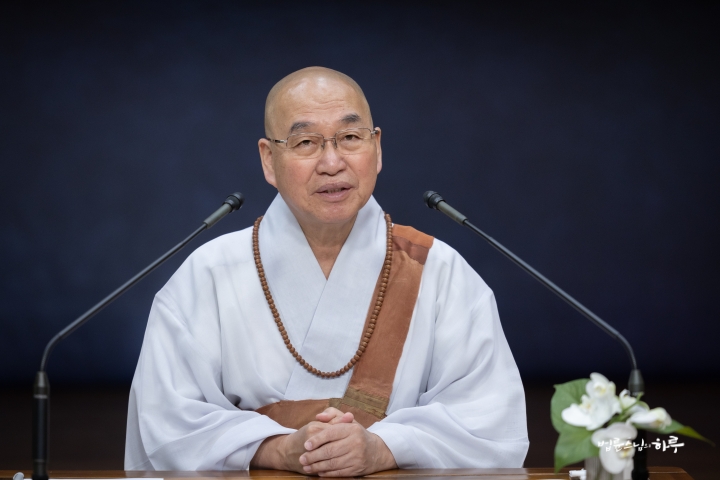
“Recognition means simply knowing things as they are. If you fall, you recognize ‘Oh, I’ve fallen.’ Some people might sit and cry after falling, while others might get up again. Just because you recognize that you’ve fallen doesn’t necessarily mean you’ll get up. If you’ve fallen, you need to recognize the fact that you’ve fallen. That increases the likelihood of getting up. If you don’t even know you’ve fallen, the chances of getting up are very low. Knowing you’ve fallen means you can get up if you have the will.
When you keep making resolutions to do something and fail, you start to abuse yourself, thinking ‘I can’t do it.’ This leads to gradually losing faith in yourself. But mindfulness doesn’t negate yourself. If you’re angry, you simply recognize ‘Oh, I’m angry.’ If you’ve expressed anger, you recognize ‘Oh, I’ve expressed anger.’ Recognizing ‘I’m angry’ doesn’t mean the anger disappears. You often ask, ‘How can I not get angry?’ If you’re in a situation where you can’t help but be angry, resolving not to be angry has a high chance of failure.
The questioner is someone who has just started studying the mind. It’s already overwhelming to know yourself, so trying to change yourself already is getting too far ahead. It’s like someone who can’t even crawl trying to fly. If you’ve fallen, just recognize ‘Oh, I’ve fallen.’ If you’re angry, recognize ‘Oh, I’m angry,’ if you’re greedy, recognize ‘Oh, I’m greedy.’ Thinking ‘I shouldn’t be greedy’ is willpower. With willpower, things might go as you wish, or they might not. If they do, that’s fortunate, but if they don’t, you’ll get stressed. However, in the state of simply knowing ‘I’m greedy,’ there’s no stress.
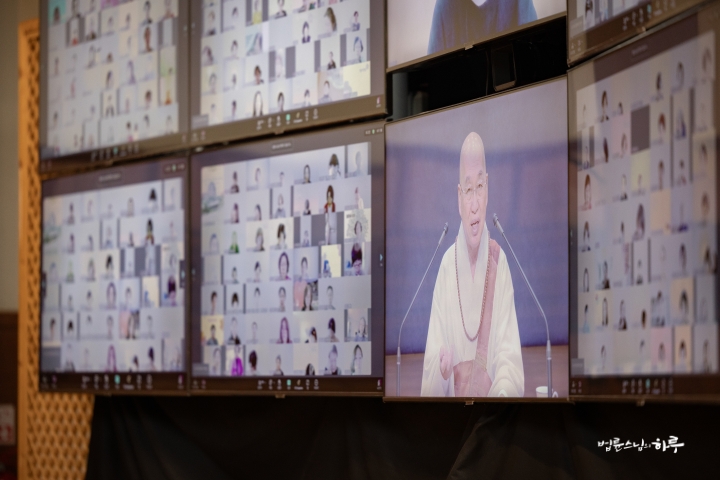
Recognition means not making judgments like ‘I should be angry,’ ‘I shouldn’t be angry,’ ‘I should be greedy,’ or ‘I shouldn’t be greedy.’ It’s about knowing your state: ‘I’m in an angry state now,’ ‘I’m in a greedy state.’ Socrates said, ‘Know thyself.’ Knowing your state is the first step. How to deal with it is something to consider later. But most of us are so fixated on results, always thinking about what we should do and how, that we don’t really know our own state. That’s why people often get angry frequently but when someone says, ‘Why are you angry?’ they react with ‘When was I angry?’ Or they try to share responsibility with the other person by saying, ‘Don’t you ever get angry?’ It’s important to recognize that you’re in an angry state right now, but people are often not interested in their own anger and instead fixate on others’ issues.
Practice is first about recognizing your own state. If you’re angry, recognize ‘Oh, I’m angry,’ if you’ve expressed anger, recognize ‘Oh, I’ve expressed anger,’ if something someone said makes you feel bad, simply recognize ‘I’m feeling bad now.’ It’s not important whether ‘recognizing anger makes it disappear’ or ‘recognizing anger doesn’t make it disappear.’ Most people don’t know their own state. That’s why there’s even a song lyric that goes, ‘Even a doctor who claims to know everything in the world doesn’t know himself. What a fool!’
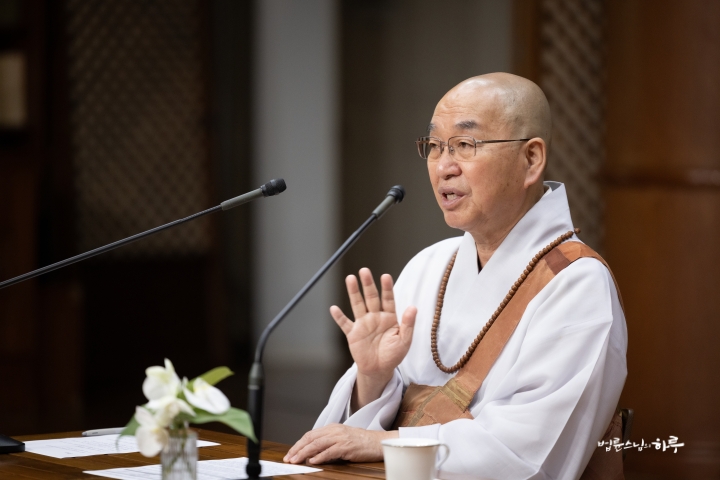
Knowing yourself is the first study task. You simply recognize. If you’re angry, recognize ‘Oh, I’m angry,’ if you’re still angry, recognize ‘I’m still angry now,’ if you’ve expressed anger, recognize ‘Oh, I’ve expressed anger.’ Being angry and expressing anger are different. If you try to suppress your anger when you’re angry, thinking ‘I shouldn’t express anger,’ you get stressed. If the stress is severe, you might explode with anger without even realizing it. Expressing anger has consequences. It creates conflict with others. Then you try to suppress your anger again. Most of us live like this, alternating between suppressing anger and expressing it.
It’s said that on average, Koreans can only suppress their anger three times. People often use the expression ‘Not just once, not just twice, but three times!’ and explode with anger on the third time. Suppression is not practice. It might be better than not suppressing in the short term, but when it all bursts out at once, the damage is often greater. So suppression is an ethical issue. Practice is not about ethics. In practice, when you’re angry, you simply recognize ‘Oh, I’m angry,’ when you’ve expressed anger, you recognize ‘Oh, I’ve expressed anger,’ and if consequences follow, you recognize ‘Oh, these consequences are coming to me now because I expressed anger.’
As you continue to recognize your state like this, you gradually become aware that acting according to your temperament leads to losses. Gradually, in your unconscious mind, you naturally start to get less angry, or even if anger arises, you don’t express it outwardly, naturally changing in a direction where anger decreases. It’s not about making resolutions or determinations to change. The important thing is ‘recognition.’ You simply recognize. Don’t think about what happens after recognition now, just practice recognizing. Don’t think, ‘Will anger disappear if I recognize it?’ When you’re angry, practice recognizing ‘Oh, I’m angry now,’ when you express anger, recognize ‘Oh, I’m expressing anger now,’ and if expressing anger leads to losses, recognize ‘Oh, losses are following.'”
“Yes, thank you.”
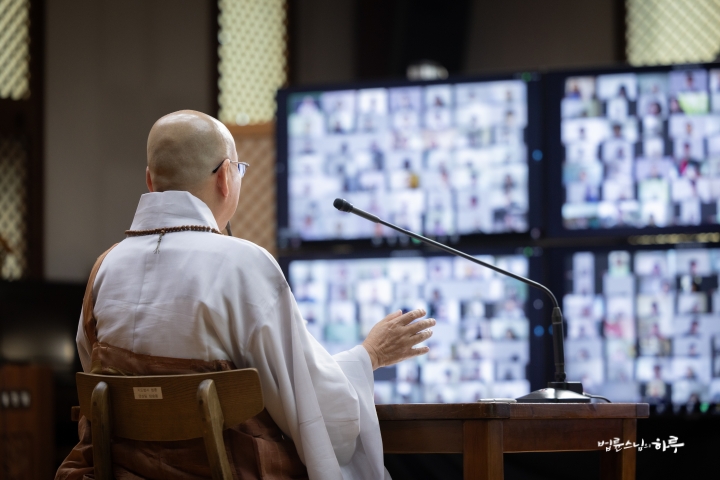
The questions continued.
When sharing our thoughts, what attitude should we have to listen with respect for the other person? Are there any practical methods to listen without judgment?
How can we maintain the middle way in situations where anger is necessary?
When personal feelings arise towards a fellow practitioner, is there a way to naturally accept these feelings while maintaining a professional relationship?
When faced with various problems and conflicts, how can we see the facts as they are? What perspective should we adopt?
As it was almost noon, the live broadcast ended. The students gathered in their respective virtual classrooms to continue sharing their thoughts. Sunim immediately recorded a preview lecture for the Thousand-Day Practice at the same location.
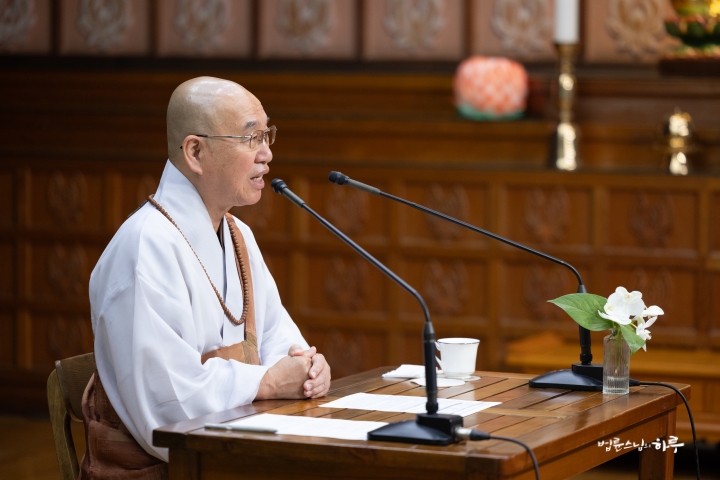
After finishing the recording, Sunim spent the afternoon indoors proofreading manuscripts and handling various tasks.

Tomorrow, at the Jeongto Social and Cultural Center, there will be a closing ceremony for the 6th 100-day prayer session of the 1st 1000-day prayer commitment of the 2nd 10,000-day prayer resolution, as well as an opening ceremony for the 7th 100-day prayer session. In the afternoon, Sunim is scheduled to have a conversation time with all members of the Happiness Movement Headquarters.




